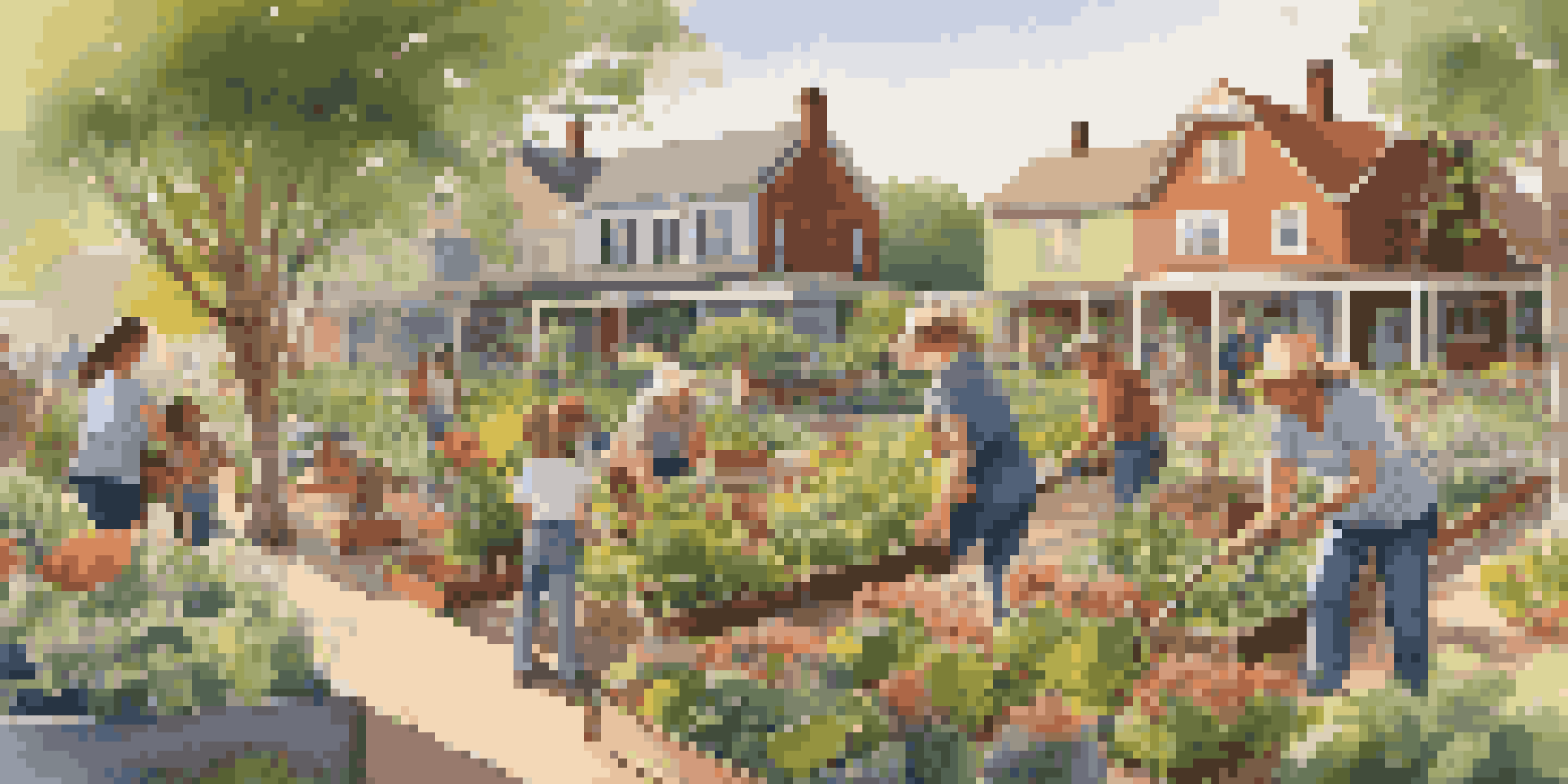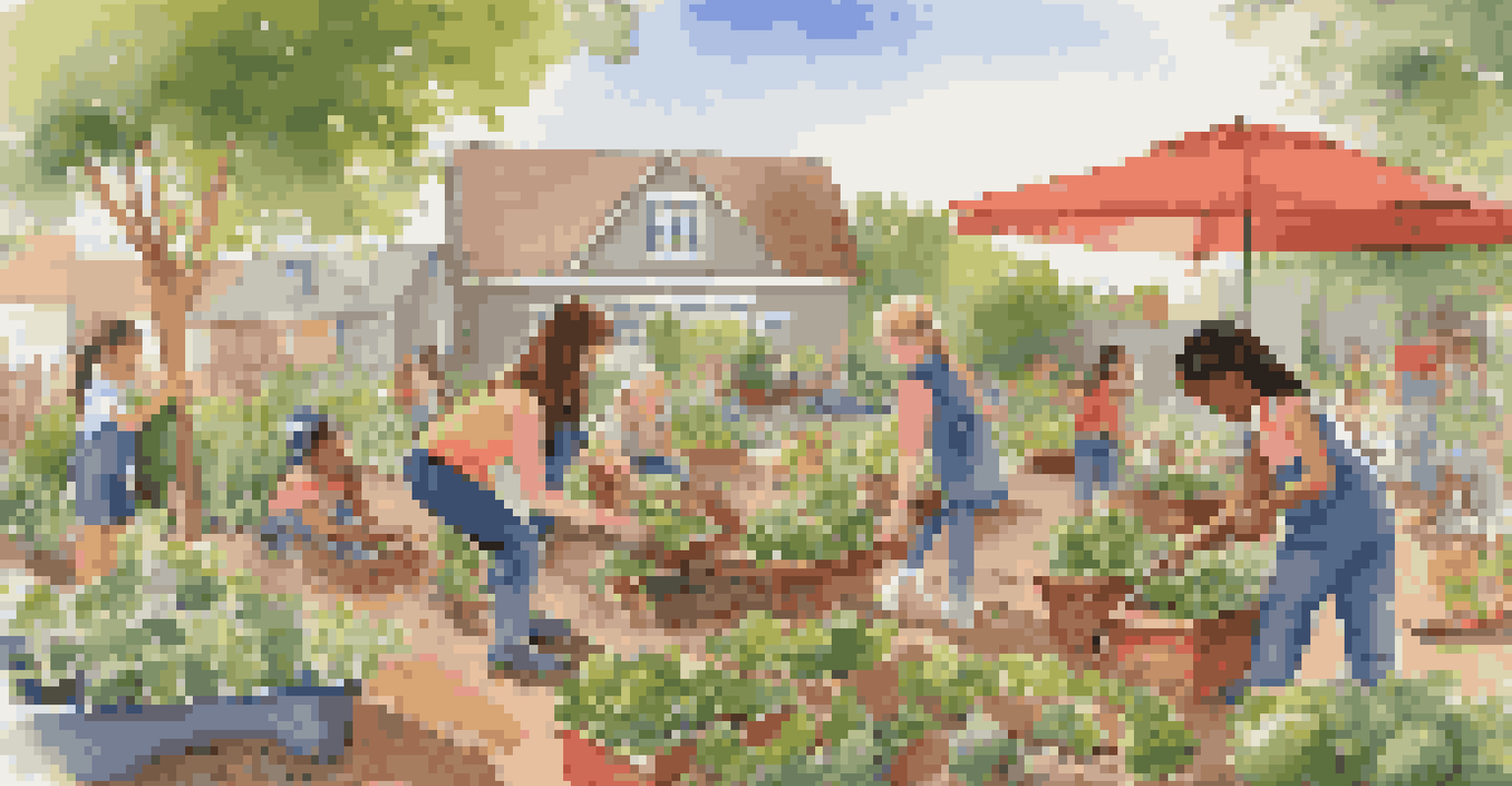Gardening as a Form of Active Lifestyle for Community Health

The Growing Trend of Gardening in Communities
In recent years, gardening has blossomed into a popular community activity. More people are recognizing its benefits, not just for personal enjoyment but also for overall community health. This trend gives rise to community gardens, where neighbors come together to cultivate not just plants but also relationships.
To plant a garden is to believe in tomorrow.
These gardens often serve as green spaces in urban areas, providing a refreshing escape from concrete jungles. They encourage social interaction and collaboration among participants, creating a sense of belonging. When people share gardening tips or plant care duties, they foster connections that can enhance mental well-being.
Moreover, community gardens can improve access to fresh produce, making healthy eating more attainable. This is particularly important in food deserts, where grocery stores may be scarce. By growing their own vegetables and herbs, community members take charge of their health and nutrition.
Physical Benefits of Gardening: More Than Just Digging
Gardening is a fantastic way to incorporate physical activity into daily life without it feeling like a chore. Pulling weeds, planting seeds, and harvesting crops all involve various movements that engage different muscle groups. It's a fun and productive way to stay active while enjoying the great outdoors.

Research shows that gardening can burn as many calories as a brisk walk. Activities like digging, hoeing, and raking can provide a solid workout, making it a low-impact exercise option for people of all fitness levels. You might find yourself building strength and endurance without even realizing it!
Gardening Strengthens Community Bonds
Community gardens foster relationships and social cohesion among neighbors, contributing to a sense of belonging.
Additionally, being outdoors while gardening can enhance mood and mental clarity. The combination of physical activity, fresh air, and exposure to sunlight can elevate serotonin levels, leading to improved mental health. This holistic benefit makes gardening not just a hobby but a lifestyle choice.
Mental Health Benefits of Connecting with Nature
Gardening isn't just about physical activity; it's also a powerful tool for mental well-being. Engaging with nature has been shown to reduce stress, anxiety, and depressive symptoms. The act of nurturing plants can be a therapeutic experience, allowing individuals to focus on growth and renewal.
Gardening adds years to your life and life to your years.
Moreover, spending time in green spaces can boost mood and enhance cognitive functions. The sights, sounds, and smells of nature can create a calming environment that promotes mindfulness. This practice can help clear the mind, making it easier to handle daily pressures.
Gardening also instills a sense of accomplishment. Watching your plants flourish from tiny seeds can be incredibly rewarding, providing a tangible sense of progress. This satisfaction can contribute to a more positive outlook on life, encouraging individuals to engage further with their community.
Building Community Through Collaborative Gardening
One of the most beautiful aspects of gardening is its ability to bring people together. Community gardens often rely on teamwork, with members collaborating on various tasks, from planting to maintenance. This collaboration fosters a sense of unity and shared purpose.
As individuals work side by side, they share stories, skills, and laughter, cultivating friendships that extend beyond the garden. These connections can turn into support networks, enhancing social cohesion within the community. In times of need, these relationships can provide emotional and practical support.
Physical and Mental Health Boosts
Engaging in gardening provides both physical exercise and mental health benefits, enhancing overall well-being.
Additionally, communal gardening can empower communities to address local issues. By working together, residents can advocate for better resources, improved public spaces, and increased access to healthy food. This collective action can lead to lasting changes that benefit everyone.
Sustainability and Environmental Awareness Through Gardening
Gardening encourages sustainable practices that can positively impact the environment. When people grow their own food, they often become more conscious of their consumption and waste. Techniques such as composting and using organic methods can be shared within the gardening community, promoting eco-friendly habits.
By participating in gardening, individuals develop a deeper appreciation for nature and the ecosystems around them. This awareness can inspire people to take action in their daily lives, whether it’s reducing plastic use or advocating for conservation efforts. Gardening becomes a gateway to broader environmental stewardship.
Moreover, community gardens contribute to urban biodiversity. They provide habitats for pollinators and other wildlife, enhancing the local ecosystem. This biodiversity not only benefits the environment but also enriches the gardening experience, as community members witness the beauty of nature flourishing around them.
Educational Opportunities Through Gardening Initiatives
Community gardens often serve as educational hubs, providing opportunities for people of all ages to learn about gardening practices. Workshops on topics like organic gardening, pest management, and seasonal planting can empower individuals with valuable skills. This knowledge not only enhances gardening success but also promotes self-sufficiency.
Schools can also benefit from gardening initiatives, integrating them into their curricula. Students who participate in hands-on gardening projects develop a greater understanding of biology, nutrition, and environmental science. This interactive learning approach can spark curiosity and encourage lifelong learning.
Environmental Awareness and Action
Participating in gardening promotes sustainable practices and fosters a greater appreciation for local ecosystems.
Additionally, these educational experiences can foster a sense of responsibility. When individuals take care of plants, they learn about the importance of nurturing and patience. This understanding can translate into other aspects of life, helping individuals become more conscientious citizens.
Conclusion: Embracing Gardening for Healthier Communities
Gardening offers a unique blend of physical activity, mental health benefits, and community engagement. As more individuals recognize these advantages, communities can thrive through collaborative green efforts. Gardening cultivates not only plants but also friendships, knowledge, and a healthier lifestyle.
By embracing gardening as a form of active living, we can build stronger, more resilient communities. Whether you have a sprawling backyard or a small balcony, every effort counts. The act of tending to a garden can create a ripple effect, inspiring others to join in and reap the numerous benefits.

In the end, gardening is more than just a pastime; it's a powerful means to enhance community health and well-being. So, grab your shovel and get ready to dig into a fulfilling journey that connects you with nature and those around you.